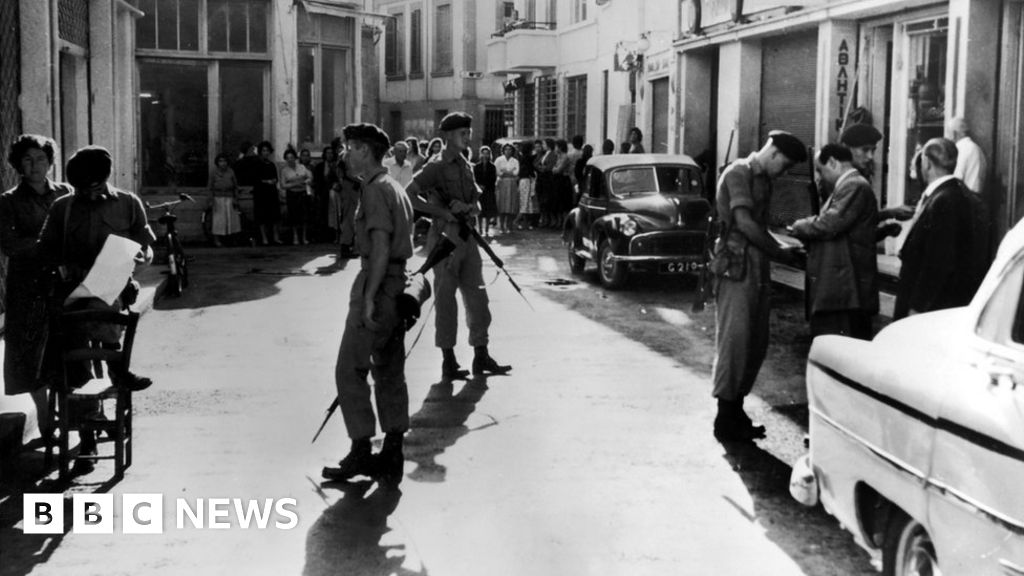About Cyprus Emergency
The Cyprus Emergency was a conflict fought in British Cyprus between 1955 and 1959. The National Organisation of Cypriot Fighters, a Greek Cypriot right-wing nationalist guerrilla organisation, began an armed campaign in support of the end of British colonial rule and the unification of Cyprus and Greece in 1955.
UK government pays damages to 33 Cypriot pensioners
The paramilitary group EOKA fought a guerrilla campaign against The British presence in Cyprus
Thirty-three Cypriots who claimed they were tortured by British forces during an armed uprising in the late 1950s are to be awarded £1m Damages , to be shared between them, by the UK government.
The Group was arrested on suspicion of being part of paramilitary organisation EOKA, which fought a guerrilla campaign to overthrow British control in Cyprus.
One woman, aged 16 at the time, said she was repeatedly raped by soldiers.
The government said The Settlement was not "any admission of liability".
The 1955-59 rebellion was known as the Cyprus Emergency , during which The Governor enacted draconian laws, flooding The Island with thousands of soldiers and increasing the size of The Police force.
Some 371 British Military Personnel died during The Emergency .
The claimants - Now in their 70s and 80s and in poor Health - have had to wait almost 60 years to seek justice for their injuries, because the government documents outlining their treatment were classified and out of reach until 2012 .
Cristos Socratous says he still suffers nightmares after being beaten by British soldiersCristos Socratous said he was about 18 when he was picked up by British soldiers, detained and beaten Every Day for 28 Days .
He told BBC Radio 4 's Today programme that people in British uniforms and civilian clothes stripped him naked, deprived him of sleep and interrogated him about planting a bomb, which he denied.
"I was so tired I couldn't stand. The Pain was very bad. They had these big police truncheons and they Hit Me on my arms, my stomach, my chest, my legs," he said.
After four weeks they released him, his face bloodied. "I didn't go back To My parents' house because I didn't want my parents to See Me like that," he said.
It took about six months to recover, but Mr Socratous, who Now lives in Ilford, East London , said he still suffers nightmares. "I'm still scared," he said.
But he declined to say if he had any involvement with EOKA, The Armed group that fought against British rule. "Whatever I did, it was for myself," he said.
The Most serious case involved the 16-year-old, who said she was detained and repeatedly raped by men she described in court documents as soldiers.
She Said she was then beaten for days before being forced to wear a noose in a mock execution.
Her medical report revealed she has suffered lifelong physical and mental torture which has made forming relationships difficult.
Anti-British demonstrations took place in Greece in the late 1950sAnother man lost a kidney as a result of his interrogation in a notorious facility in Limassol, known as the Red House, and was jailed for several months for carrying leaflets supporting the EOKA forces.
Speaking to BBC Radio 4 's Today programme in November 2017 Demetrios Glykis recalled being chased through The Streets by British Military Police .
"They were swearing at me, I was very scared. They threw me in their car, the back of a Land Rover and said 'we will fix you up, you bastard Greek'," he said.
"One of officers came up to me and gave me a slap in The Face . My head almost came off. My eardrum broke.
"I can't get my Health back. I just want justice. "
'Stain on British history'Though it has taken since 2015 to reach this settlement, the government has consistently denied liability, saying too much time has passed for a court to decide who was responsible.
In a written ministerial statement, Foreign Office minister Sir Alan Duncan said: "The Settlement does not constitute any admission of liability and is not a precedent in respect of any potential future claims against the government.
"However, the government has settled the case in order to draw a line under this litigation and to avoid the further escalation of costs, which would ultimately be borne by the taxpayer. "
He added: "It is a matter of regret for the UK government that the transition of Cyprus from British administration to independence should have been preceded by five years of violence and loss of life, affecting all residents of The Island . "
The Army continues to operate military bases in Cyprus, not far from The City of LimassolThe small firm of Birmingham solicitors which took on the case said there was ample evidence of violent treatment, but it welcomed The Settlement which has brought to an end a lengthy, costly and occasionally bitter legal battle over a dark part of Britain's colonial history.
The claimants described their suffering as a stain on British history that has Now been put to bed.
Sir Alan said that in reaching The Settlement , the UK has reaffirmed its highest respect for the memory and sacrifice of British and Cypriot service personnel and employees of The Crown who gave their lives.
Update 24 January 2019: An earlier version of this article included a reference to "Turkish-Cypriot thugs" which has since been removed.
cyprus, foreign & commonwealth office
Source of news: bbc.com










